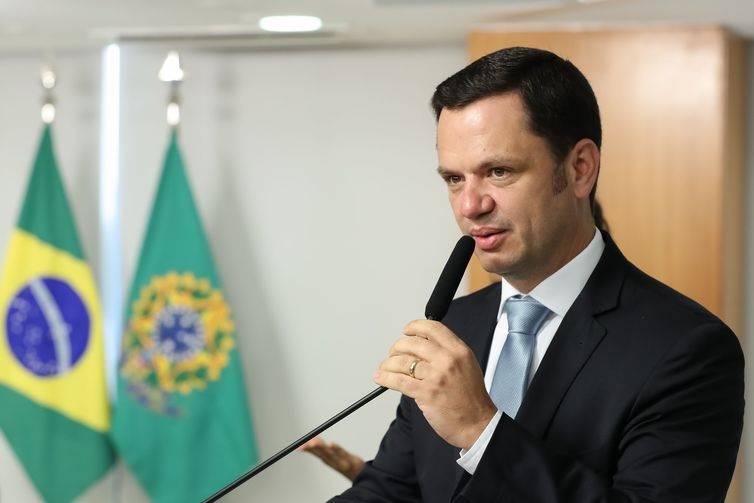RIO DE JANEIRO, BRAZIL – The fight against organized crime in Rio de Janeiro is work that has to be done jointly by the state and federal governments but needs to count on the action of the Judiciary.
The statement is from the Minister of Justice and Public Safety, Anderson Torres, for whom “unfortunately Rio de Janeiro, today, is part, if not the heart of this problem [organized crime]”.
Torres said that since taking office in the ministry, he has been with the state governor Claudio Castro several times and that he has, as the top public safety manager in Brazil, “not treated the state as a special case.”

“A case apart, that needs to be discussed between the powers, state and federal government. This problem here in Rio de Janeiro is chronic, and we need to start treating it in a serious and organized way together. Alone, the state government can’t solve it. The federal government can’t intervene.
“We have to find a way out of this, together with the Judiciary and the Public Ministry,” defended the minister when speaking at the inauguration of the superintendent of the Federal Police in Rio de Janeiro, delegate Ivo Roberto Costa da Silva.
Torres said that the new superintendent has an enormous challenge and a tremendous responsibility of a chronic problem ahead of him.
“I thank you for taking on this challenge because here, the priority is really the highest, and our urgency is the highest in all aspects,” he said. The minister also thanked the outgoing superintendent, Tácio Muzzi de Carvalho, for his “beautiful” work.
The minister agreed with the criticism from the General Director of the Federal Police, Márcio Nunes de Oliveira, who, in a previous speech, without naming them, said that there are communities in the state where the police cannot enter because of judicial decisions made by people who don’t know the local reality.
“It was placed here judicial decisions by people who don’t know what a community is and don’t know the reality of Rio de Janeiro.
“Government decisions that throughout history have complicated the state of Rio de Janeiro, transformed our city, perhaps the most beautiful city in the country, into an extremely complicated city to live in, where chaos is often installed, and we don’t know how long this will remain the way it is,” he said.
Torres defended the occupation of the spaces by the public power to keep organized crime away.
“The state needs to be in charge again in all of Rio de Janeiro and not only in part of it. We can not remain without access to spaces in Rio de Janeiro. We cannot submit the population of any country’s area to control other than state control. It worries us a lot. It is a matter of priority for our nation, for the country,” he said.
INDEXES
According to the Minister of Justice, in the one year and two months he has been at the head of the portfolio, there has been an increase in crime reduction resulting from an integrated public security effort.
“The numbers are advancing; we reduced homicides by 7%; 4,000 lives were saved last year in Brazil, excellent, but how many 4,000 lives were lost? That is what we have to think about. That is all we have to work on.”
MILITIA
Torres revealed that he attended the preview of the documentary Brasil Paralelo on June 13.
“When we sit in front of a gigantic screen to see those images of criminality in Brazil, and especially of crime in Rio de Janeiro, we see the size of the responsibility of all of us. And when I say all of us, I mean all of us, the police, all of us prosecutors, judges, military, everyone.
“The militia in Brazil continues to be one of the main problems that devastate our society. Unfortunately, the state of Rio de Janeiro stands out in this”.
The minister announced that next week there would be a meeting in Brasilia with Justice and Public Safety ministers from South American countries to discuss the problem of organized crime in the region.
“We need to discuss strategies. The problems are common; they are joint problems. Crime has long extrapolated their countries’ borders, and it worries me a lot. Unfortunately, Rio de Janeiro today is part, if not the heart, of this problem,” he said.
“What happens today in Rio de Janeiro, which has been restructuring itself over the years, is a reflection throughout Brazil, and worse, is a reflection throughout South America,” he said.
The new superintendent of the Federal Police in Rio de Janeiro, Ivo Roberto Costa da Silva, also defended the need to concentrate efforts in the fight against organized crime, “which each day acts with more violence, using real weapons of war to dominate territories.”
The relentless fight against drug trafficking, arms trafficking, and money laundering, always focusing on the financial decapitalization of these criminal groups, shows itself as the most efficient way to combat these organized crime structures.
Allied to this, the union of efforts and the integrated work of the public security forces emerge as an essential tool to achieve the intended goals.
CORRUPTION
The delegate defended the fight against corruption and remembered the statement made by former deputy Ulisses Guimarães when the 1988 Federal Constitution was promulgated.
“Corruption is the termite of the Republic. The Republic, soiled by unpunished corruption, falls into the hands of demagogues who, under the pretext of saving it, tyrannize it. Do not steal, do not let others steal, and put the thieves in jail; this is the first commandment of public morality.”
With information from Agência Brasil

